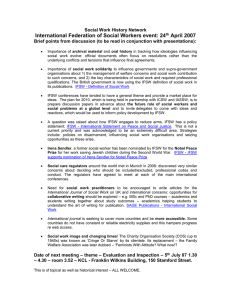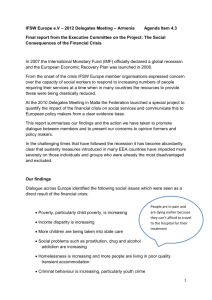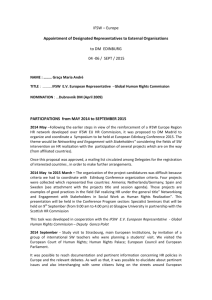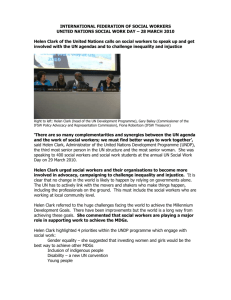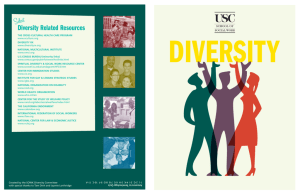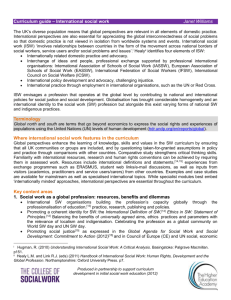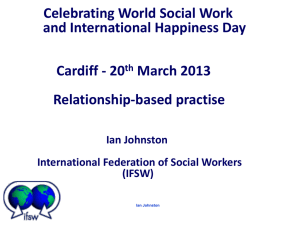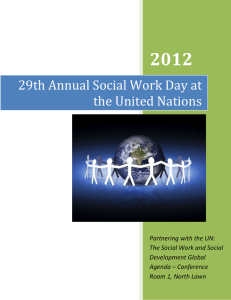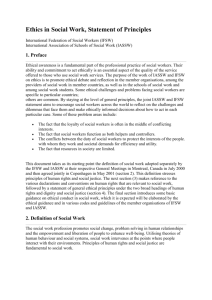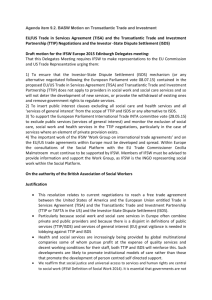Birth Registration Human Rights resolution 22/7 IFSW European Right Commission
advertisement
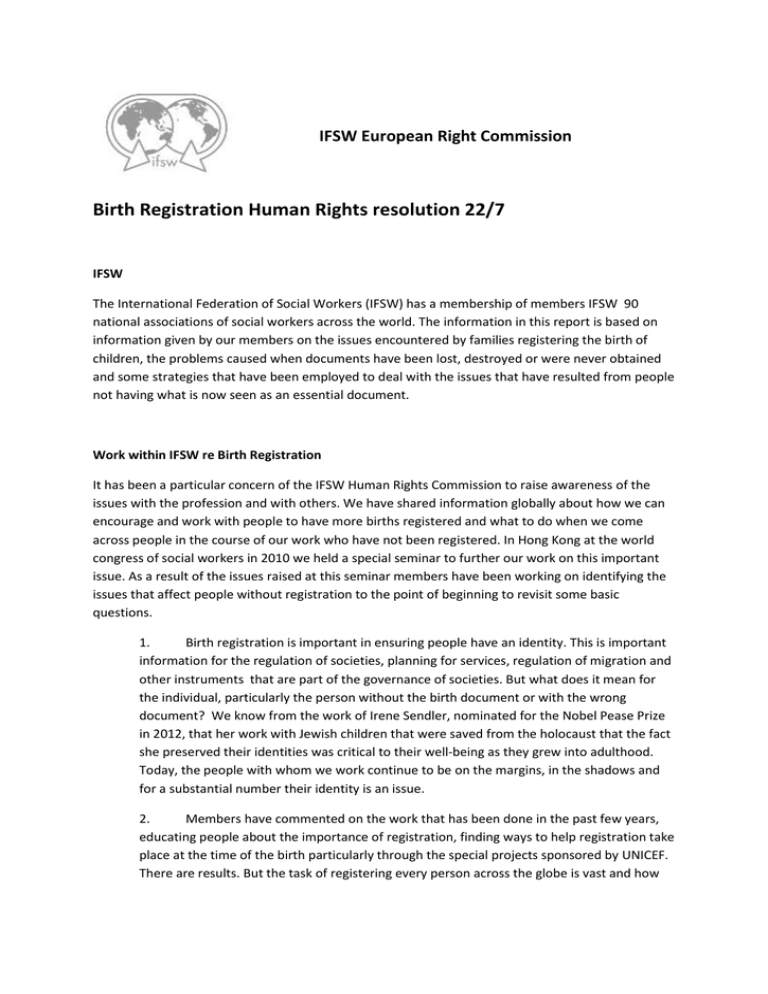
IFSW European Right Commission Birth Registration Human Rights resolution 22/7 IFSW The International Federation of Social Workers (IFSW) has a membership of members IFSW 90 national associations of social workers across the world. The information in this report is based on information given by our members on the issues encountered by families registering the birth of children, the problems caused when documents have been lost, destroyed or were never obtained and some strategies that have been employed to deal with the issues that have resulted from people not having what is now seen as an essential document. Work within IFSW re Birth Registration It has been a particular concern of the IFSW Human Rights Commission to raise awareness of the issues with the profession and with others. We have shared information globally about how we can encourage and work with people to have more births registered and what to do when we come across people in the course of our work who have not been registered. In Hong Kong at the world congress of social workers in 2010 we held a special seminar to further our work on this important issue. As a result of the issues raised at this seminar members have been working on identifying the issues that affect people without registration to the point of beginning to revisit some basic questions. 1. Birth registration is important in ensuring people have an identity. This is important information for the regulation of societies, planning for services, regulation of migration and other instruments that are part of the governance of societies. But what does it mean for the individual, particularly the person without the birth document or with the wrong document? We know from the work of Irene Sendler, nominated for the Nobel Pease Prize in 2012, that her work with Jewish children that were saved from the holocaust that the fact she preserved their identities was critical to their well-being as they grew into adulthood. Today, the people with whom we work continue to be on the margins, in the shadows and for a substantial number their identity is an issue. 2. Members have commented on the work that has been done in the past few years, educating people about the importance of registration, finding ways to help registration take place at the time of the birth particularly through the special projects sponsored by UNICEF. There are results. But the task of registering every person across the globe is vast and how long will it take? Is the enormity of the task helping us think through how best to meet the needs of people and governments in the ways we are currently approaching the problem? 3. The question that 1 & 2 address came from our thinking after considering the work done by Knowing Children and Judith Ennew. If stateless children in Thailand can have an identity established and secured in Switzerland should we be rethinking the concept of birth registration with our new technologies and our knowledge of DNA? 4. Is the purpose of birth registration about good governance or is it about a person's identity? Issues raised from social work practice Evidence from our members confirms this is not just a problem for communities in remote or developing countries understanding or accessing registration points but is a complex global issue where people are migrating from one country to another for economic, political reasons or to escape war or traumatic environmental crises. We have also encountered cases were children have been born in secret and kept from public view and awareness, there were well publicised cases in Austria and the USA in the past three years where vulnerable young people and adults had been sexually exploited and abused. We see people in severe distress when their inability to show their identity or citizenship through lack of birth documentation presents. We see discrimination perpetuated with communities like the Rom in Europe. We see the barriers societies put in place to keep people on the margins and in the shadows. It has led to asking a further question as to whether the current methods of registration in themselves create a barrier to people not be recognised by an identity or citizenship? We then have to create new systems for re-admitting people to an identity as we have seen in the complex arrangements State parties use for regulating migration, particularly for asylum seekers and refugees. We have an analogy in how some cultures have created systems of adoption so that children who cannot be looked after by their birth families are adopted by adults and then lose their birth identity and take on the identity from another family. These systems then have created systems for the adopted person, on reaching a certain age, can trace their original identity. Other cultures have developed different systems that do not hide birth identity and look at a fostering system that acknowledges the birth identity. Both systems are designed to ensure that the child is brought up in safety and security, but which is in the best interest of the child, given that each child is different? These are complex issues but help us reflect on the importance of identity and birth registration to the individual as an official expression of identity as well as helping states parties in issues of governance and planning. So far we have described issues of concern often brought about by ignorance, remoteness or civil movements of people. However our members often work with the victims of organised criminals. In these situations people experience fear and at times physical, sexual and emotional abuse by the people who are in power and have control over them. These are people exploited for their labour, sex or medical organs. They may be people who have never had an official identity or once have had an identity, when we come across them they have often lost it. Issues for the future based on good examples of encouraging birth registration There is a need to continue the major education programme to explain the importance to parents about the need for birth registration. It is increasingly important in this world to have a formal identity to access the rights and responsibilities embodied in the Human Rights Treaties and Conventions. The main question the IFSW would at this stage like to raise is are we helping people gain and retain that official identity in the most effective and resilient way, using modern technology could we evolve a more global system that would enhance individual human rights, empowering people who live in the shadows of our communities? Can we learn from peoples journeys, like those children who were saved by Irene Sendler? What can we learn from and thinking about the impact of registering citizenship developed by Knowing Children? In this world of better technology we need to think of more secure methods to ensure births are registered and that the correct registration verification links with the person. Could this have a wider application for other vulnerable people? Conclusion From the experiences of our members we would urge a point of reflection before planning the next stage of planning intervention in encouraging birth registration. It is important for peoples identity. It is important for governance but current systems are open to be ignored or falsified. Given the resources that are going into supporting systems that may have become flawed by becoming outdated in their current form is there room in the forthcoming work to look at more radical ways of ensuring people have an identity which is uniquely theirs even when they are on the margins? Making sure that people feel included in their societies adds to social capital that builds community capacity and enhances society. Ruth Stark IFSW Human Rights Commission
